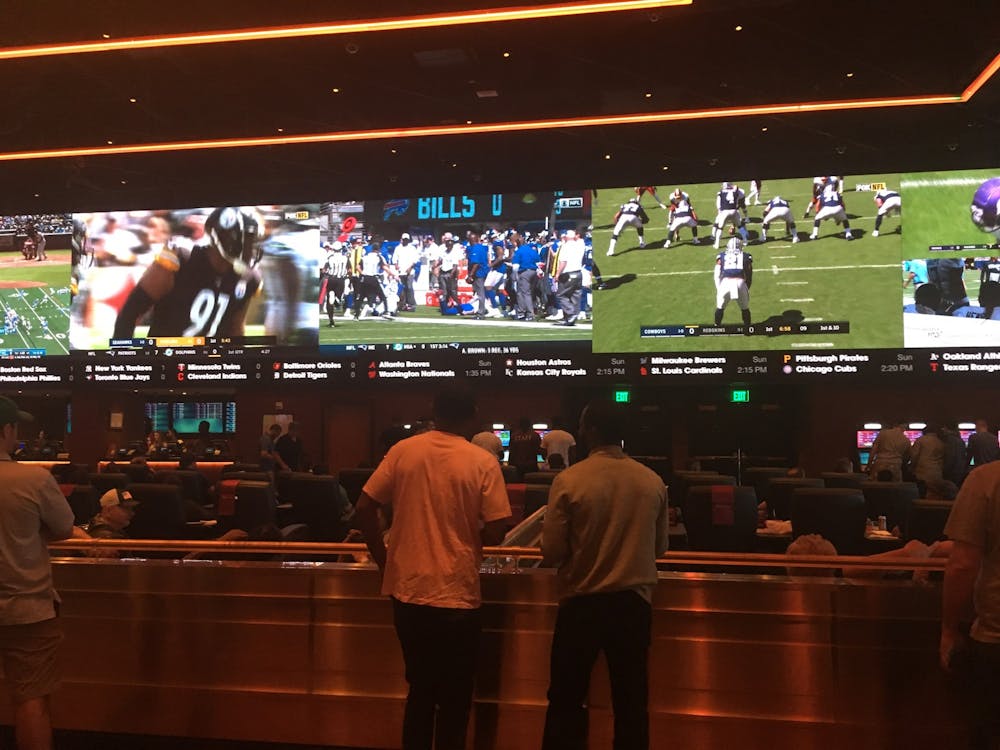In January, University of Dayton basketball head coach Anthony Grant and his team received threatening messages after losing to the VCU Rams.
The culprits? Sports bettors who had lost their wager due to the team’s defeat.
This story came just two weeks after the legalization of sports gambling in Ohio. Grant expressed frustration against the bettors and concern for his players, who received similar messages after the game.
Gambling is relatively new in Ohio, so the state isn’t properly equipped to handle the conflicts that will arise, including the increasing addictions of sports gambling among young adults. Similar to other addictions, a gambling addiction occurs when an individual’s gambling behaviors become unhealthy. Gambling for college students is a great concern when considering age as a factor.
Jody Bechtold, an internationally certified gambling counselor, believes that the damages of a gambling disorder are higher for those under the age of 25 when the brain isn’t fully developed. For her, the rapid legalization of online gambling can be problematic without a plan to solve gambling-related problems.
“I know Ohio in general is doing a lot to build capacity,” Bechtold said. “They’re really trying to stay in pace with the expansion, where other states have not done that at all. In Connecticut, they have had widespread gambling for over a year, and they are just now addressing it.”
When an individual develops a gambling addiction, the signs can be subtle. According to Matthew McMurray, a professor at Miami who works with the Better Institute for Responsible Gaming, Lotteries, and Sport, the most obvious signs of a gambling addiction are the ones that directly affect an individual’s day-to-day life.
“Can you perform your job?” McMurray said. “Can you go to class? Do you think about [gambling] all day, every day? Are you structuring your life around it? These are all major risk factors for this disorder, and might suggest to me that someone should follow up on that and seek assistance.”
Another conflict that has arisen in the months following the legalization of gambling is the growing trends of online threats from gamblers who didn’t hit their bet due to a player’s performance.
“Whenever money gets involved, people get antsy,” Alex Reid, director of compliance for Miami Athletics, said.
Reid works with the athletic department to educate athletes on the NCAA’s policies regarding sports betting and the resources available to athletes if they receive messages or are threatened online.
The NCAA prohibits athletes and anyone associated with collegiate athletics from gambling on sports at any level. They are prohibited from betting on high school sports, NCAA-sponsored collegiate sports, and professional sports. The purpose of this is to protect the integrity of the game and to keep sports fair.
Enjoy what you're reading?
Signup for our newsletter
In order to keep athletes at Miami from getting involved in sports gambling, Reid educates them on the NCAA’s policies with gambling and the repercussions of violating these policies.
“We’re educating them as much as we can: sending out reminders, meeting with athletes, sending emails before large events like the Super Bowl,” Reid said.
At the beginning of each year, there is a meeting with every student athlete at Miami, where Reid and the athletic department discuss sports gambling and the penalties athletes face if they choose to gamble, including suspensions and loss of eligibility. This meeting reaches every incoming student-athlete as well as every returning athlete.
After this meeting, emails and reminders are sent to the athletes throughout the year. However, outside of these educational materials, there isn’t any way for Reid or anyone in the athletic department to know if an athlete is gambling. Reid said no matter how much they educate the athletes, it’s ultimately their individual decision to gamble.
“We make sure [the athletes] have the resources available to them, but ultimately, people make the decisions they want to make,” Reid said.
Keeping his athletes from gambling isn’t the only concern for Reid and the athletic department. The much larger concern is keeping them safe from harassment and threats from sports bettors.
“Athletes are trying to compete and win,” Reid said. “Not to help bettors.”
While there haven’t been any reported instances of athletes receiving online harassment or threats from bettors at Miami, it is a growing trend that the athletic department needs to be aware of.
The NCAA has policies prohibiting athletes from participating in sports gambling, but the enforcement of these policies remains questionable. According to data from the NCAA, it is estimated that 24% of male student-athletes and 5% of female student-athletes reported betting on sports within the past year. Additionally, 9% of male student-athletes and 1% of female student-athletes reported betting on sports once a month or more.
This concern for student-athletes becoming involved in sports gambling grows with the increasing legalization of gambling. Because of the easy access to gambling online, athletes are more tempted to participate in gambling.
“You can educate as much as you want, but when someone wants to go down that route, that’s their choice,” Reid said. “They have to make that decision and deal with the consequences that may come.”




